
If you're looking for the video game equivalent of a Porsche with a dent, PixelJunk Shooter is the game for you. Shooter is almost flawless, but the key word there is "almost." Every aspect of the game has some niggling imperfection associated with it that puts a slight blemish on a great experience. Let's run down everything to love about PixelJunk Shooter and the little flaws that hold it back.

What To Love: So you've been sent to this planet to go rescue some scientists and workers who bit off a little more than they could chew in trying to mine for resources. The game's story is given to you through some scrolling Star Wars text, then through speech bubbles from special survivors you save throughout the levels. It's not an especially creative way to deliver the story, but it works well in context. What's really cool about it is how subtle some details are.
For instance, in every level, you can't progress until you've accounted for all the survivors, regardless of whether you saved them or killed them. But to unlock more levels, you've got to find hidden diamonds throughout the levels. This progression structure alone had me dreaming up Alien scenarios of power-hungry corporations more concerned with profit than human life. It leaves a lot unexplained on the basis that using your imagination to fill in the blanks is more satisfying, and it totally is.
The Little Flaw: Unfortunately, that's also why it's so disappointing when it just spells everything out for you in plain text. The special survivors you collect will literally just tell you what's happening with the planet, what went wrong with the mining operation, and even lecture you with some of the least subtle political agenda I've ever seen. It's as if the designers were scared you wouldn't "get" the message and decided to beat you over the head with it to make sure.

What To Love: Considering that they came out within a week of each other, it's a little shocking how similar PixelJunk Shooter is to Gravity Crash, each taking the same basic concept and going in two completely different directions with it. While Gravity Crash can be a little polarizing in how old-school it is, Shooter is refreshingly modern: There's no pull of gravity on your ship, you don't need to worry about fuel, and you can crash into the walls as many times as you want with no penalty.
Combine all that with pitch-perfect movement controls and you've got a game that could've been really punishing and slow-paced but decided instead to just lighten up for the sake of quick, accessible fun. Good call.
The Little Flaw: The problem is that it's not quite modern enough. The game conditions you into thinking that the days of annoying one-hit deaths are over, then introduces enemies that can one-hit kill you. Maybe it's because it's so progressive in so many other ways, but dying from one hit in this game is really frustrating, especially near the end of the game and during boss battles.
And as much as I love the movement controls, Shooter's setup for actually shooting is puzzling at best. Both right shoulder buttons do the same fire commands, which would be fine if there weren't two fire commands. Tap R1/R2 to fire a regular missile or hold it down to fire homing missiles. I don't really get why the controls don't use R1 to fire a regular missile and R2 to fire homing missiles. Considering the amount of buttons a PS3 controller has, it doesn't make sense to use two buttons for three commands.
With such imprecise controls to fire homing missiles, you'd think they'd at least be really useful, but I assure you, they're not. Their tendency to fly right past the intended enemy and into a survivor makes the fact that you have to take damage to use them feel insulting.

What To Love: Other than explaining the controls and your general goal for each level in an optional "How To Play" menu, the game never really tells you what you're supposed to be doing. In most games, that would be a huge problem, but it's actually really cool here. Instead of being explicitly told at the start of a level what happens when water meets magma or magma meets gas, you find out on your own. You'll come face-to-face with some new gameplay element you've never encountered before and approach with complete uncertainty of what will happen next.
The Little Flaw: Occasionally, that totally backfires because the solution isn't something you'd ever guess on your own. I spent half an hour trying and retrying a level because I couldn't figure out what the hell I was supposed to do next until I finally gave in and looked online for the answer. Turns out that my ship just had an ability that was never disclosed to me, the pilot, and was necessary to progress.
Yet at the same time, there were several instances where I was just having fun exploring a level or messing with the different elements when a survivor would get impatient and yell the solution to a puzzle I hadn't even attempted yet.

What To Love: PixelJunk Monsters eventually became so difficult that the number of possible solutions for each successive level dwindled until it became all about trial-and-error. PixelJunk Eden lost its charm the further you got into each garden, replacing the joys of exploration with enough frustration that I would return to the simpler, early levels and lament what the game would later become. PixelJunk Shooter doesn't have these problems.
The levels never get so challenging that they start to impede on how fun it is just to mess around in each level. They keep introducing new stuff until the very end, so you're constantly getting new things to play with, and the puzzles don't get so overly complex that they become a chore to solve. It feels like a conscious decision was made somewhere along the line not to screw up a good thing by designing puzzles for the extremely patient or people with GameFAQs.com open, and I appreciate that.
The Little Flaw: It also feels like half the game is missing. It keeps introducing you to newer and crazier elements, new kinds of puzzles, and new ways to solve those puzzles, then stops abruptly. There's so many possibilities of cool puzzles that would require you to really think outside the box that never happen. For instance, there are four suits in the game that change your ship's abilities, yet you never use more than one per level. It constantly feels like you're being set up to start switching suits on the fly or use them against bosses or go through earlier levels with them to unlock new areas or something crazy like that, and then it ends. On a cliffhanger, no less.
But even with that dent, it's still a Porsche. All those little flaws I mentioned are just that: Little flaws. Taken as a whole, PixelJunk Shooter is great game with a clean, attractive art style, a good, unique soundtrack, and a very interesting mix of puzzles and shooting.
a clean, attractive art style, a good, unique soundtrack, and a very interesting mix of puzzles and shooting.















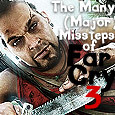
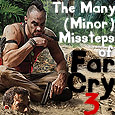
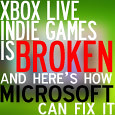
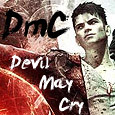
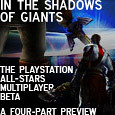






No comments:
Post a Comment